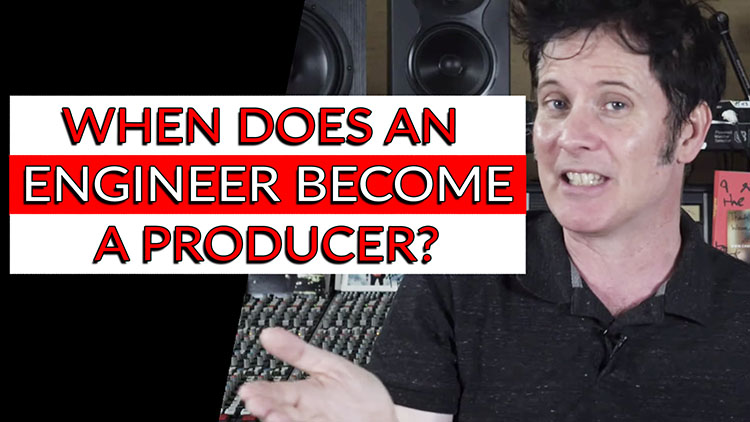As always we have a bunch of marvellous questions in today’s episode!
So let’s jump right into today’s featured question! “At what point does the engineer become the producer?”
This is a really big question, because I think everyone who has engineered has had this happen!
The example given in the question is:
A band has hired me and my studio to record. During the process, I as the engineer, start to offer production advice to help make the recording better. As we go along I add more production to at the band’s request. They ask things like, “What do you think the song means?”
In my personal experience, I have always felt very strongly that if I have been hired to do a specific job, that is the job that I do. And then, if I’ve been hired specifically as the engineer, and I want to give production advice, I’m free to do it, and they’re free to take it or ignore it. However, this doesn’t mean that just because I gave production advice that they took, I’m now a producer.
The reality is that if my job is to the engineer, it’s really up to me to take responsibility for myself. If I want to add these extra comments and they get taken, that’s great! But I cannot be resentful if, at the end of the record, I’m not credited as produced or co-produced.
I have been hired by a lot of rookie producers who are coming up and they hire a more experienced engineer because they know that they will be be able to fill in the gaps in their own skills. It might be that the producer is really really good with people, they might be able to inspire, they might be able to get really good performance from people, they might have a good ear for songs, but lacking in other areas, so they might hire an engineer that will make up for some of their shortfalls.
In the end, though, it is up to me if I decide I want to add some production help. For me to say to the producer that I want a production credit at the very end of the project is a little late. If I go into an album with an inexperienced producer who is hiring me as an engineer, I might say I would like to be a co-producer, and the way around that is to have the name of the producer listed at the main production, but underneath have myself listed as both “co-produced” and “engineered”. This way, they still get a main production, but I get a co-production and engineering credit.
Most of the time I did not get my engineering credit changed to producer, but I ended up producing much of the records. It was my choice to go in there with a guitar player and work out the guitar parts with him, or work on the chord arrangements, and other things, but that is what I do. I don’t want to stop being myself, someone who loves music and wants to give my all to it, even my credit is merely engineer.
Now let’s put ourselves in the specific position you’re talking about, where somebody comes to you and hires you and your studio and says they want to produce themselves, and they say they want to hire you as an engineer.
I think the first thing you should do is have a meeting with them and find out whether they have any idea how they want to be produced. Sit down with them and get to know them. After that, if you don’t believe that they are going to be capable of producing themselves really well, and you’re going to end up doing a lot of production, just ask in the nicest possible way, “Would you give me a co-production credit?” The band can be listed as “Produced by The Band” and underneath it will say co-produced and engineered by you, just as I mentioned I have done!
If they say they don’t need any production help, they just want an engineer, you have at least created a clear boundary of what you’re willing to do and if it gets to the point where, in the session, they’re asking your opinion and you’re helping a lot, you could point out that this is why you were asking if you could get a co-production credit, and you may be able to have that conversation again and work something out. The difficulty arises when you haven’t had any conversation with the band or the artist at the beginning, but then you start offering help, and then you start feeling resentful that all of a sudden you feel like you’re co-producing a record, but they’re not giving you any credit.
In any situation, it is in your best interest to be honest and up-front right from the beginning. Make sure you set boundaries that outline what you are willing to do in the position you have been hired for. If it seems like you will be doing more, or they begin asking for more from you, simply have a conversation so you can work something out that works for all parties involved!
We cover the following questions during this episode of FAQ Friday!
• At what point does the engineer become the producer? (0:48)
• If a band wants both a cd and a vinyl album would you do two different mixes, or would you let the mastering engineer deal with the two masters from the same mix? (9:47)
• Do you bus lead vocal and background (vocals) separately or do you send them all to the same bus? Or sometimes both? (12:19)
• How do you breath some character and vibe into a lifeless virtual instrument or live recorded sound? (14:31)
• How important is mix referencing and checking in mono? And beginning in mono? (19:20)
